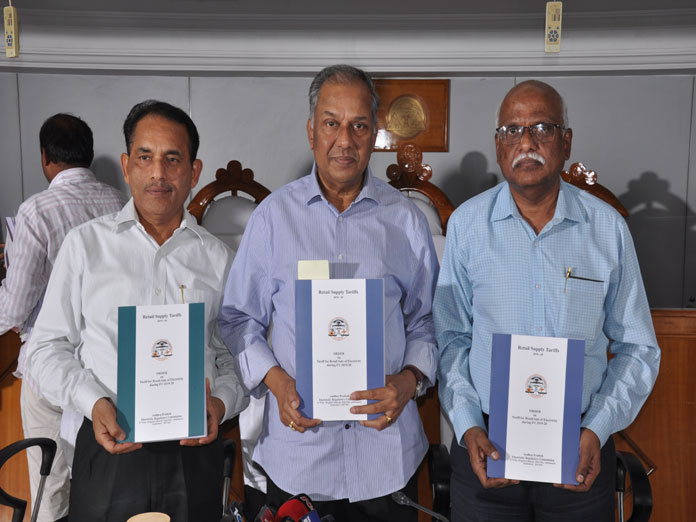Retail tariff boon to ryots, weaker sections

Lakhs of farmers and weaker sections, mostly backward classes, will be benefited with the decision of the state government on power supply and concessions offered to various sections of people
Vijayawada: Lakhs of farmers and weaker sections, mostly backward classes, will be benefited with the decision of the state government on power supply and concessions offered to various sections of people.
The AP Electricity Regulatory Commission (APERC) on Friday announced the Retail Power Tariff to consumers for the Financial Year 2019-20. In continuation of the farmer-friendly policies, free power is extended to all non-corporate farmers (by merging the sub-categories) irrespective of their land holdings, type of land and number of connections, benefitting about 3 lakhs farmers.
The state government is providing Rs 7,064.27 crore for 2019-20 as subsidy for free supply of power to all non-corporate farmers for nine (9) hours a day.
The subsidy to agriculturists which was standing at Rs 1711 crore for both the discoms in 2014-15 has now reached Rs 7,064.27 crore for 2019-20. Free power supply is extended to sugar cane crushing farmers connected to agricultural / rural feeders.
Free power is extended to rural horticultural nurseries and dhobi ghats with subsidy from the state government. Laundries run by below the poverty line (BPL) Rajaka community (150 units), shops of professional goldsmiths of BPL category (100 units), households of BPL Most Backward Communities and saloons run by BPL Nayee Brahmins are provided free power supply (to the extent of the number of units per month specified against each category) on Direct Benefit Transfer (DBT) mode.
Agro-based cottage industries of more than 10 HP in LT are given a benefit of Rs.2.85 per unit by including them in Category-V (D):LT. They are hitherto billed in LT Industrial category.
Energy charges for mushroom and rabbit farming are reduced by Rs 2.16/unit (from Rs 5.91 to Rs 3.75) and demand charges are reduced by Rs 55/kw (Rs. 75/kw to Rs. 20/kw) by including them in the sub-category of agro-based activities.
Rice milling industry is given a big relief by inclusion in seasonal industries category. Energy charges for salt farming units are reduced by Rs 1.20/unit (from Rs.3.70 to Rs.2.50) and demand charges are totally exempted (from Rs 20/HP to zero). Energy charges for floriculture in green houses are reduced by Rs.1.06/unit (from Rs.5.91 to Rs.4.85/unit).
Charges for LT category poultry hatcheries and poultry feed mixing plants are reduced by Rs 1.04 /unit (from Rs 4.89/unit to Rs 3.85/unit). Load factor incentive scheme is reintroduced to HT industry by extending a benefit up to 50 paise per unit, to encourage the industrial consumption and also to improve the overall per unit rate of realisation of discoms, while continuing the concession of Rs 1 per unit during off-peak period of eight hours a day.








